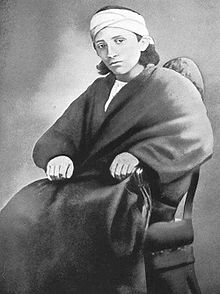- Mírzá Mihdí
-
Mírzá Mihdí (Persian: ميرزا مهدي) (1848-June 23, 1870), given the title Ghusn-i-Athar (the Purest Branch). Mírzá Mihdí was born Mihdí Núrí[1] in Tehran, and named after a deceased brother of his father.[2]
Contents
Biography
He was the youngest child of Bahá’u’lláh and Navváb.[3][4] He was the favourite child of his mother.[5] Mihdí did not remember his once luxurious life as at the age of four his father was arrested and imprisoned on account of his faith. The family were left in penury and his sister later recollected how the siblings would hold each other and weep.[6] When his family were exiled to Baghdad the family thought it necessary to leave Mírzá Mihdí in Persia as a result of his health. He was left to the care of his maternal great-grandmother and his paternal aunt. The separation was hard for his family, especially his mother.[7]
At the age of twelve he rejoined his family in Baghdad. There he accompanied his father through all his exiles and grew very close to him.[8] He later became the amanuenses of Bahá’u’lláh and a staunch companion. He was beloved by the Bahá’ís ; revered in a similar sense to ‘Abdu’l-Bahá and was noted for his meekness, piety, purity and sincerity. Whilst rapped in prayer[9] chanting the Ode of the Dove (a prayer revealed by his father during the period in Kurdistan) and pacing on the rooftop, Mírzá Mihdí fell through a sky-light which pierced his lungs.[10] Bahá’u’lláh was horrified and asked for a physician to attend his son.[11] However, by this time it was too late. His mother was especially hurt and poignantly caressed her blood soaked son shortly before his death.[12] Bahá’u’lláh was heard lamenting “Mihdí! O Mihdí!” as his son was dying.[13] His companions surrounding him on his death-bed remember his courtesy despite his pain, and even apologizing at the fact he was laying before their presence.[14][15]
He died on June 23, 1870 at the age of just twenty-two.[16] His dying wish was that the believers would attain the presence of Bahá’u’lláh, a wish which the broken-hearted Bahá’u’lláh accepted. His body was taken away and buried in a Muslim cemetery. His sister collected the blood-soaked clothes of Mihdí and other relics. These are seen in the National Bahá'í Archives in Israel. Bahá’u’lláh eulogized his son and connected the subsequent easing of restrictions and pilgrims ability to visit him to his dying prayer. He wrote that his death caused “the Concourse on high to lament”. He also exalted his death, comparing it to the intended sacrifice of Abraham’s son, the crucifixion of Christ and the martyrdom of the Imam Husayn.[17] Bahá’u’lláh also named him the Purest Branch. The exiles and companions commented that he had been a "pillar of strength" amongst the exiles and adored for his gentleness and patience.[18]
Shoghi Effendi later removed the body of Mírzá Mihdí and reinterred it alongside his mother Navváb[19] in the gardens below the Arc on Mount Carmel in Haifa in an area now called the Monument Gardens.[20]
See also
Others buried in the Monument Gardens:
- Ásiyih Khánum — Bahá'u'lláh's first wife, Mirzá Mihdí's mother (Also called Nawab)
- Bahíyyih Khánum — Mirzá Mihdí's elder sister
- Munirih Khánum — wife of `Abdu'l-Bahá, Mirzá Mihdí's elder brother
Notes
- ^ Núrí being the surname of his father
- ^ Taherzadeh 2000, p. 204
- ^ Ma'ani 2008, p. 91
- ^ Smith 1999, p. 262
- ^ Ma'ani 2008, p. 19
- ^ Blomfield 1975, p. 68
- ^ Ma'ani 2008, p. 101
- ^ Effendi 1944, p. 188
- ^ Taherzadeh 2000, p. 205
- ^ Smith 1999, p. 246
- ^ Balyuzi 2000, p. 310
- ^ Ma'ani 2008, p. 110
- ^ Balyuzi 2000, p. 311
- ^ Balyuzi 2000, p. 311
- ^ In Persian custom, it is rude to be laying down in front of people; it is viewed as disrespectful
- ^ Ma'ani 2008, p. 150
- ^ Effendi 1944, p. 188
- ^ Balyuzi 2000, p. 312
- ^ Smith 1999, p. 259
- ^ Smith 1999, p. 247
References
- Smith, Peter (1999). A Concise Encyclopedia of the Bahá'í Faith. Oxford, UK: Oneworld Publications. ISBN 1851681841.
- Razavi, Shahriar (2009). "Mihdí, Mírzá (1848-70)". Bahá’í Encyclopedia Project. Evanston, IL: National Spiritual Assembly of the Bahá’ís of the United States. http://www.bahai-encyclopedia-project.org/index.php?view=article&catid=37%3Abiography&id=163%3Amihdi-mirza&option=com_content&Itemid=74.
- Taherzadeh, A. (1984). The Revelation of Bahá'u'lláh, Volume 3: `Akka, The Early Years 1868-77. Oxford, UK: George Ronald. ISBN 0853981442. http://www.peyman.info/cl/Baha'i/Others/ROB/V3/Cover.html.
- Balyuzi, H.M. (2000). Bahá'u'lláh, King of Glory. Oxford, UK: George Ronald. ISBN 0853983283.
- Blomfield (1956). The Chosen Highway. London, UK: Bahá'í Publishing Trust (published 1975). ISBN 0877430152. http://arthursclassicnovels.com/arthurs/bahai/choshw10.html.
- Ma'ani, Baharieh Rouhani (2008). Leaves of the Twin Divine Trees. Oxford, UK: George Ronald. ISBN 0853985332.
- Effendi, Shoghi (1944). God Passes By. Baha'i Publishing Trust. ISBN 0877430209.
External links
Bahá'í Faith Central figures 
Scripture Key figures Principal teachings See also Symbols · Texts · Teachings · Laws · History · Administration · Calendar · Pilgrimage · Prayer · CategoryCategories:- Bahá'í holy family
- People from Tehran
- Burials in Israel
- People from Acre, Israel
- Iranian prisoners and detainees
- 1870 deaths
- Bahá'í stubs
Wikimedia Foundation. 2010.

